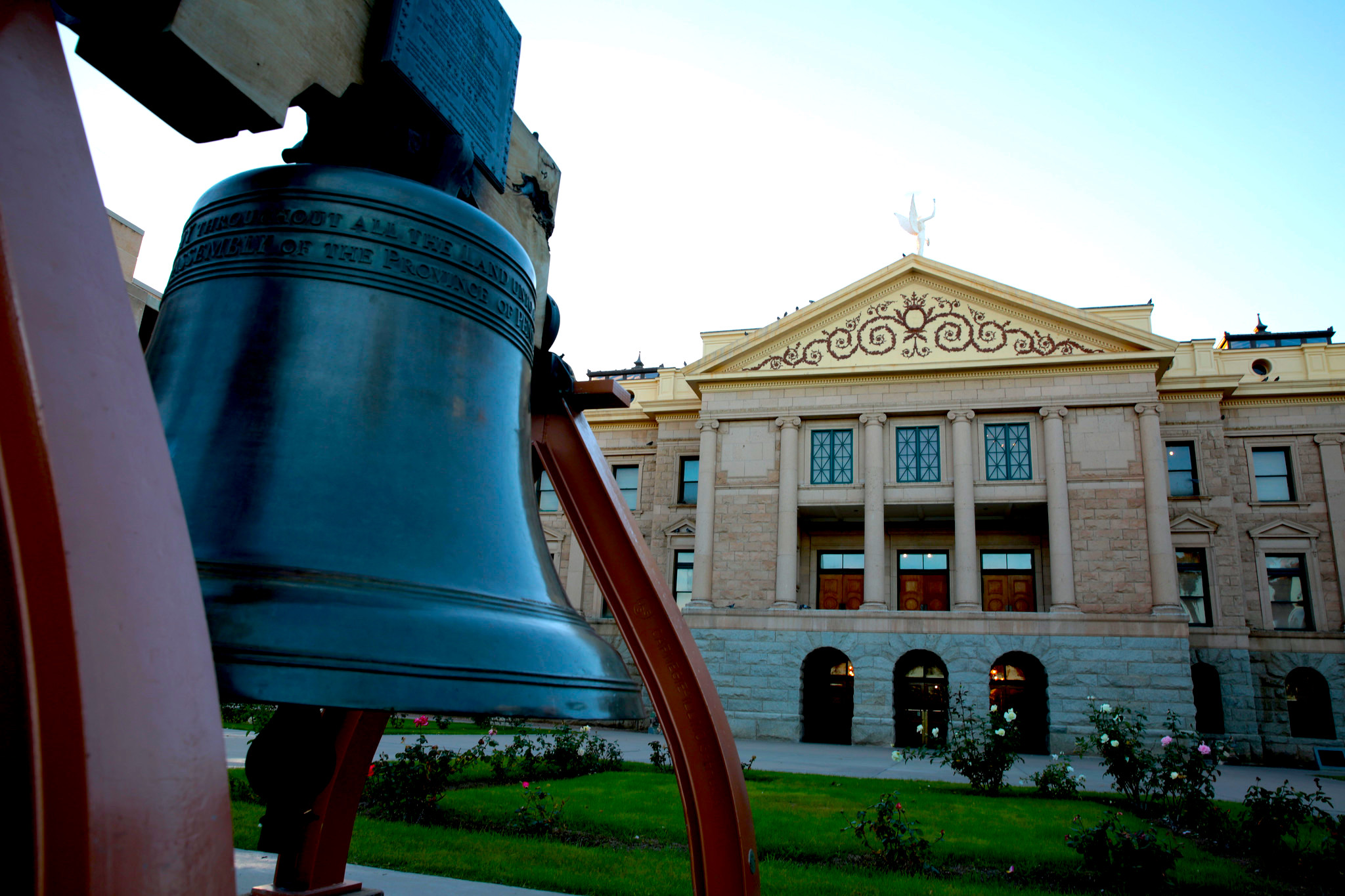The more impact a ballot initiative has in rebalancing resources and control, the more likely it is to face powerfully coordinated efforts to stop its enforcement, write Benjamin Fong and Benjamin Case.

The Arizona Capitol Museum in the Capitol Complex in Phoenix. (Gage Skidmore, Flickr, CC BY-SA 2.0)
By Benjamin Fong and Benjamin Case
Common Dreams

 With numerous initiative campaigns around the country raising minimum wages, protecting abortion rights, and in the case of Massachusetts’s Fair Share Amendment, taxing the rich to fund public services, the left is finally waking to the power of ballot initiatives as tools to advance egalitarian and redistributive policy.
With numerous initiative campaigns around the country raising minimum wages, protecting abortion rights, and in the case of Massachusetts’s Fair Share Amendment, taxing the rich to fund public services, the left is finally waking to the power of ballot initiatives as tools to advance egalitarian and redistributive policy.
Where legislators are either too timid or too compromised by corporate interests and wealthy donors, voters tend to back progressive policy, even voters who tend not to choose anyone with a D next to their name. Floridians in 2020 and Arizonans in 2016 both went for Donald Trump for president and increased the minimum wage.
Running ballot initiatives offers a path for the left to organize around working-class demands without getting sucked into the depressing vortex of Democratic Party machinery and the partisan culture war.
As a report recently published by the Center for Work & Democracy at Arizona State University shows, egalitarian initiatives pass at a 60 percent clip and redistributive ones pass at an astounding 75 percent rate. With results like these, many on the left are increasingly attracted to the initiative process as a tactical path forward.
Unfortunately, this interest has been roused at a moment when the initiative process is under concerted attack from the right. By increasing the number of petition signatures needed, making the signature-gathering process stricter, or otherwise raising the threshold for making the ballot, many states are trying to clamp down on citizens’ initiatives.
In many places, the initiative process is approaching Sisyphean levels of difficulty — irresistible as a means of directly pushing a progressive agenda but so bogged down by rule changes and oversight by hostile bureaucracies as to ultimately prove impossible.
Bellwether State

“Red for Ed” protest hosted by the Arizona Education Association at the Arizona State Capitol complex in Phoenix, 2018. (Gage Skidmore, Flickr, CC BY-SA 2.0)
The example of Arizona is instructive here. Arizona is in numerous ways a bellwether state. From regressive immigration policy to school choice, Arizonans seem cursed to preview nationwide political developments in our own perverse laboratory of democracy.
Such is the case with 2020’s Proposition 208, an initiative to fund direly under-resourced schools by taxing the rich. The measure followed years of organizing work that began with the historic 2018 Arizona teachers strike, part of the national “Red for Ed” movement.
Prop 208 was everything the left could want from a ballot initiative: a tax on wealthy individuals that would go to public schools, backed by one of the largest and best organized labor upsurges in recent memory. And it was popular. Even in a pandemic year, when the typical ground game for this kind of campaign was impossible, Prop 208 passed by a safe margin.
At the same time, California voters rejected a very similar measure in Prop 15. Against the caricature of the state as a libertarian bastion, Arizona was ready to tax the rich.
Donate Today to CN’s
2022 Winter Fund Drive
Despite its promise — or perhaps because of it — Prop 208 didn’t last long. The year after voters approved 208, the state legislature dropped down tax brackets to nullify its effects. The year after that, the State Supreme Court declared the initiative unconstitutional.
The effects of these developments have been politically devastating. Rather than being enraged at the flouting of democracy at the state capitol, Arizonans have greeted the gutting of Prop 208 with resignation and demobilization. After the high-water mark in 2018, teachers’ public image suffered during the Covid-19 pandemic, and now the signature accomplishment of their years of knocking doors has been erased.
In most parts of the country with an initiative process, ballot initiatives offer a bright spot in an otherwise depressing political vista; the same is true in Arizona, where debt relief and in-state tuition for DACA students prevailed this November. But the Grand Canyon state also offers a cautionary tale for any campaign that seeks to redistribute money and resources from the one percent to the majority.
Better Lawyers

Massachusetts State House in Boston. (Daderot, CC0, Wikimedia Commons)
The rich, many will be unsurprised to hear, have better tax lawyers than most. They can spend money on the front end to stifle redistributive efforts (mostly in the form of television ads and lawsuits against initiative campaigns, as they can almost never marshal ground games), but they can also spend on the back end to chip away at or, in the case of Prop 208, completely gut any tax policy they don’t like.
They are well-organized, they have the necessary connections, and they won’t stop until they get what they want. David does indeed sometimes win, as Marshall Ganz has reminded us, but it’s a lot harder when he plays by Goliath’s rules — and Goliath doesn’t mess around when you come for his money.
Recently, Massachusetts passed the Fair Share Amendment, a remarkably similar initiative to Arizona’s Prop 208. It creates a 4 percent tax on annual income over $1 million to fund public education, transportation and infrastructure repair.
As in Arizona, the initiative was backed solidly by organized labor, and it passed with precisely the same majority of 52 percent. As also with Prop 208, the opposition had a difficult time messaging, as most Massachusetts residents do not earn over $1 million a year. The Massachusetts Teachers Association is right to celebrate the victory as a “reason for profound hope,” as the Arizona Education Association did with Prop 208.
But the lesson from Arizona is that the true victory will be in defending the Fair Share Amendment, not just in winning it. Strip away the partisan identifications and voters will overwhelmingly choose to redistribute wealth. But the often confusing and veiled machinations of state legislatures can swiftly undermine such choices, unless there is sustained pressure on legislators.
Ballot initiatives can pass policies that politicians can’t or won’t. But on their own, they are no silver bullet. The more impact an initiative has in rebalancing resources and power, the more likely it is to face the coordinated efforts of the state legislature, judiciary and Chamber of Commerce.
Initiative campaigns that propose redistributing wealth must therefore be prepared to defend their policy before, during, and after it wins at the ballot. For the unions and community organizations that backed the Fair Share Amendment, then, the real victory will be in getting the vote to stick, and that will require returning to the roots of organizing: strategic, social disruption that makes leaving the Fair Share Amendment alone the more attractive option to the powers that be.
Benjamin Fong is the associate director of the Center for Work & Democracy at Arizona State University.
Benjamin Case is an organizer and social movement scholar. He is a postdoctoral researcher at the Center for Work and Democracy, where he leads the Ballot Initiatives Project, and he is co-author of the report, Majority Rules: The Battle for Ballot Initiatives.
This article is from Common Dreams.
The views expressed are solely those of the author and may or may not reflect those of Consortium News.
Donate Today to CN’s
2022 Winter Fund Drive


Excellent points made in this article. But one point I think needs mentioning is that taxing the rich AFTER they’ve accumulated most of the money is unlikely to ever work (because once they have the money, along with it goes all the power & control, which they invariably use to ensure that they KEEP all the power and control.)
But if you think the problem through all the way to the endgame, the inevitable conclusion is that to create any kind of egalitarian society, the rules have to be changed at a much more fundamental level, to remove all the mechanisms that allow a few people to accumulate huge concentrations of wealth in the first place. And Yes, you may count me among those who have started to think that it might be a good idea to try something else besides corporate capitalism.
Greg you are on the right track.
I watched during my working life as the great ideas of the EPA were overcome by expensive, expansive corporate legal opposition and the funding process soon overwhelmed the underfunded Agency as the congress bowed to the will of the lobbyist who funded their too frequent campaigns as EPA spending went out of site.
The lesson to be learned is that measures to hold corporations accountable most times failed as the U.S. Government shifted responsibilities for enforcement and remediation to the individual states. This process circumvented both Federal Authorities and Federal enforcement, and again funding became incredibly slow. During election years work sometimes stopped. I got my education to the process as I witnessed it in action during the remediation of the Kerr-McGee thorium contaminated site in West Chicago Illinois and the radium remediation in Ottawa Illinois. Suffice to say government contractors lined up to the gravy $$$$ train.
The lesson to be learned has not been. Instead corporate greed prevailed. Exactly where we find ourselves today.
In retrospect U.S. efforts to minimize harm to the earth and it’s environs by clamping down on corporate crimes was a terrible failure of the Federal government.
I know this statement will not be popular by any means but! What the US could use is a few years of tending to the business at hand that is critical to all of our survival. Say a few totally Federally funded actions against those same corporations or their spin offs. This might be some Social justice that actually matters.
We need to restructure what is needed here from corporate welfare to corporate responsibility.
We have huge problems and cutting the defense budget by a significant amount say 20% annually, is in my opinion of one the easiest fixes obtainable. Or I suppose we could vaporized ourselves instead.
If we all worked together it could happen. Seems far too many billionaires forgot how they made their money, call it corporate capitalism or corporate welfare, as I prefer.
‘Taxing the richest’ when they call the shots is an oxymoron.
The Fair Share Amendment is an amendment to the Massachusetts constitution. I don’t think the legislature can change it. I could be wrong. They can mess with how they categorize public education and transportation which is where the money is designated to go as per the ballot initiative. It certainly bears watching by those of us who supported it.
This is the democracy the USA wants to extend to the rest of the globe. I wonder why in Russia and China people polled seem satisfied with their governments which we regard as “authoritarian” and denigrate in every way.
What it really needs is a pair of HEALTHY BALLS!!!